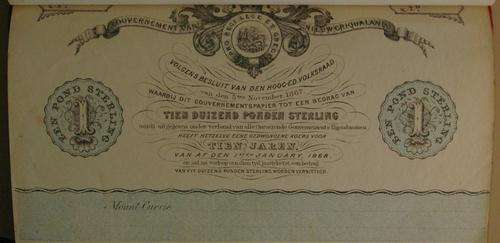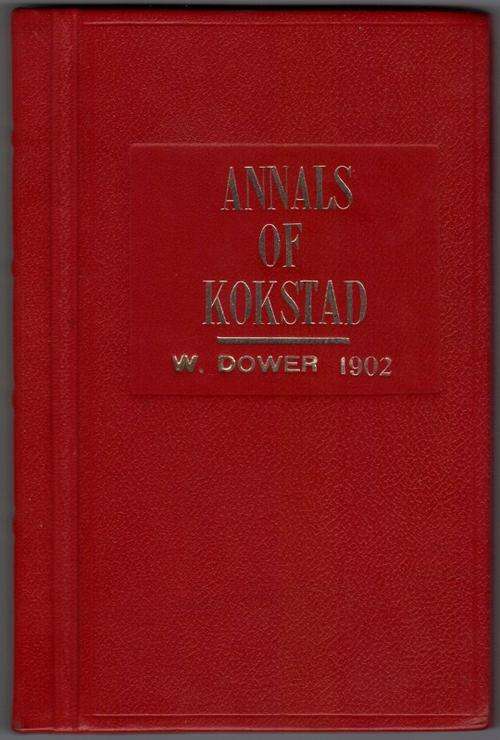
EXTREMELY RARE: The East Griqualand One Pound, 1867, Bank Note in Rev W Dower's 1902 book
Check my rate
| Main centres: | 1-3 business days |
| Regional areas: | 3-4 business days |
| Remote areas: | 3-5 business days |

| Main centres: | 1-3 business days |
| Regional areas: | 3-4 business days |
| Remote areas: | 3-5 business days |
This copy of the ORIGINAL "EARLY ANNALS OF KOKSTAD and EAST GRIQUALAND" by the Rev William Dower is impossible to find for sale today. A Griqua Een Pond note is only marginally more common. It is estimated that just ten copies of Dower's original 1902 book still exist today and not many more of the Griqua bank note. This book contains the bank note in near perfect condition (no marks, no tears).
This is what is known about the Griqua note and Dower's book:
This extremely rare Griqua bank note (Government of New Griqualand - Gouvernement van Nieuw Griqualand) was never issued. Copies of the original note can only be found in the Rev William Dower's book "The Early Annals of Kokstad and East Griqualand" (published 1902). The Balson Holdings Family Trust owns two (2) copies of Dower's original book and several 1978 reprints by the Killie Campbell Library (Durban, Natal, South Africa) which are used for hands-on research purposes. There are only a handful of the original book and note in existence, most are in museums like the Killie Campbell Library (University of Natal) and Kokstad Museum. The books in the Balson Holdings Family Trust collection have been secured after over thirty years of intensive search.
The words on the note translated say "For King, Law and People" (Pro Rege, Lege and Grege")... and "According to the resolution of the Right Honourable Volksraad, of the 5th November 1867, by which Government paper to an amount of ten thousand pounds sterling is issued under the Bond of all immovable property of the Government, this paper is compulsorily current for ten years from the 1st January 1868 and will, after the expiration of that time, be redeemable to the extent of five thousand pounds sterling per annum."
On page 129 of "The Early Annals of Kokstad and East Griqualand" Rev W Dower thanks "D Strachan Esq for the blank paper money...." (NOTE: the 1978 Killie Campbell reprint of the book has a worthless black and white facsmilie of the note originally carried in the 1902 book).
In Dower's book he also records on page 17: "They (the Griquas) decided to issue paper money, actually had it printed, but never issued it." For a man who was so intimately tied with the Griquas of Nomansland his curt description fails to address what Ken Strachan told Scott Balson when he was researching the history of the S&Co tokens and probably emphasises his frustration with some of the decisions made by Kok's Raad.Ken Strachan told Scott Balson that his grand father Donald Strachan, as the Magistrate in Umzimkulu, personally intervened and prevented the Griquas of East Griqualand from introducing this one pound note in 1868. The Griqua Raad (government) were frustrated by the highly unsatisfactory system of barter forced on the people because there was absolutely no currency in this isolated region. Strachan convinced the Griqua Raad that there was no financial basis on which to support their expensive but delusional exercise approved by the Raad so the idea was scrapped. Ken Strachan said that Donald Strachan gave Dower an estimated 100 of the bank notes for his very limited edition book before he destroyed the balance of them by burning them in a fire. In the Killie Campbell Africana Library reprint of Dower's book "The Early Annals of Kokstad and East Griqualand" the researchers confirm the fact of Donald Strachan's intervention on page 137 when they note that, 10,000 one pound notes were printed in Cape Town with "Nieuw Griqualand" on them; never issued; they were kept in the Magistrate's Office (Strachan) at Umzimkulu. The reference of Cape Parliament Papers G.58-1879, p52, is given. Strachan promised Adam Kok that he would look for an alternative to the bank notes.
A few years later he came out with his own coinage - backed by sound assets (the goods at his store) and inspired by the success of the 1860 Durban Club pieces. It was a stroke of marketing genius as the indigenous trade token currency was accepted far and wide across Nomansland, including major banks, for nearly sixty years as the name of Strachan and Co was as good as a bank in this region.
Why is the book so rare?
Ironically Dower's book was put to the torch by the Griquas soon after its publication. Dower stored them in a cupboard in the Griqua Church - but fell foul of his congregation because of some of the controversial comments he made about them. As a result of this action very few of the 1902 books survived
http://www.tokencoins.com/gr04.htm
